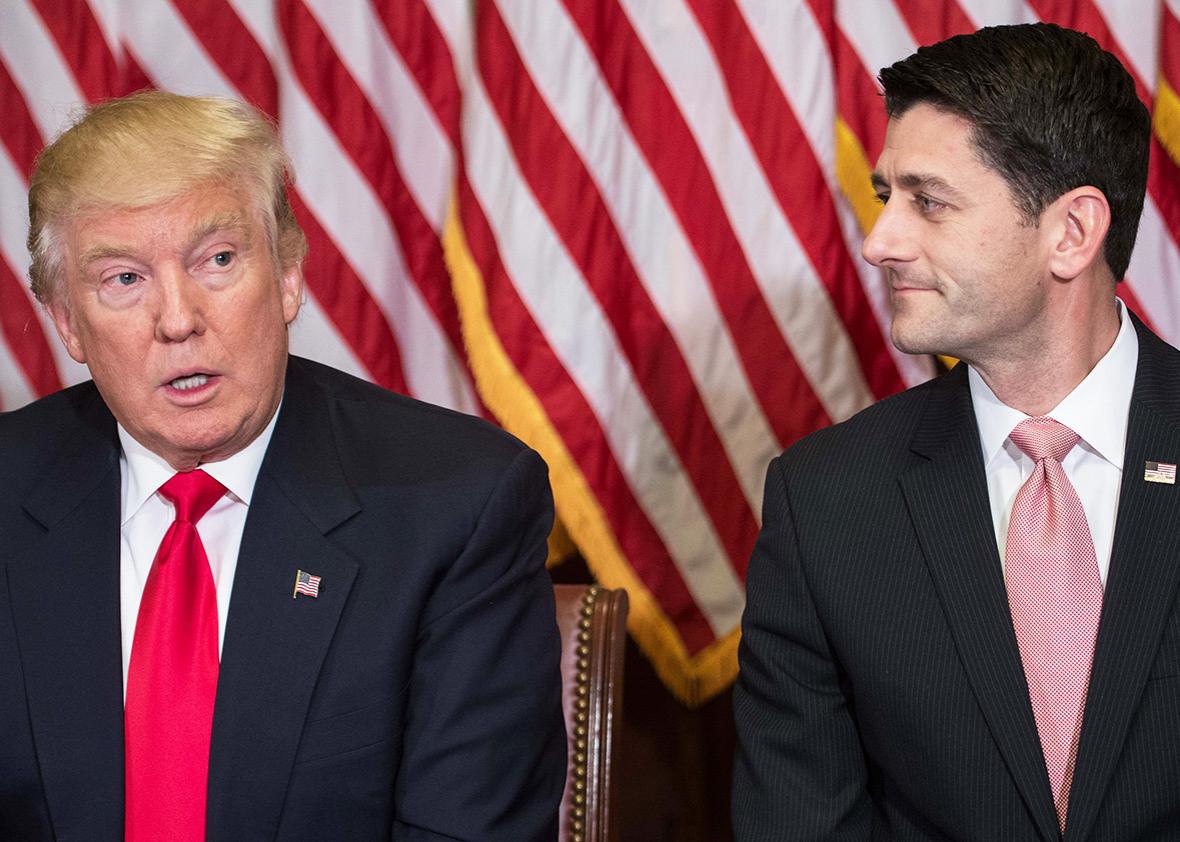Congressional Republicans will have a hard enough time repealing and “replacing” the Affordable Care Act purely as a matter of parliamentary maneuvering and vote-counting skill. What they don’t need on top of this impossible effort is a certain hammy television character, the same one assuming control of America’s real-life executive branch in a few short days, opining from the sideline and forgoing any apparent messaging coordination with the knowledgeable humans doing the work.
They don’t need Donald Trump promising more than they can deliver.
One of the trickiest problems in this legislative slog is setting reasonable expectations. Hill Republicans do not want their metric for success in replacement to be the one by which Democrats measure Obamacare’s: the number of newly insured. There is a Republican plan to revoke insurance from roughly 30 million people, but there is no Republican plan to restore it. That would require the sort of vast disbursement of federal money that’s anathema to conservative ideology.
There may be some health insurance tax credit component to Republican replacement legislation, but the replacers’ main target will be regulation: cutting the ACA’s coverage requirements, allowing insurers to sell plans across state lines, eliminating “community rating” for plan pricing, and guaranteeing coverage for those with pre-existing conditions only if they maintain continuous coverage. Republicans are insisting that their goal is less “universal coverage” than “universal access,” meaning, in their view, that insurance will be more affordable to all those interested in purchasing it once certain regulations are loosened or off the books. To the extent that deregulation would lower costs for some, it would do so by pricing those most in need of coverage out of the market. Negotiating this is all delicate, difficult stuff. Republicans don’t want to assume the additional expectation of meeting Obamacare’s big coverage numbers, a weight Democrats have been trying to hang around their counterparts’ necks.
But it wasn’t a Democrat over the weekend who set the expectation that Republicans’ plan would offer “insurance for everybody.” That quote tumbled from the mouth of the aforementioned ham who on Friday will be sworn in as the 45th president of the United States.
“We’re going to have insurance for everybody,” Trump told the Washington Post in an interview. Further twisting the knife, he disassociated himself from the other conservative ideological principle of pulling oneself up by the bootstraps to find money to pay for the right to live. “There was a philosophy in some circles that if you can’t pay for it, you don’t get it,” he said. “That’s not going to happen with us.” He promised “great health care” under his law, “in much simplified form,” that would be “much less expensive and much better.” Picture congressional Republicans as the waiter at an East Coast seafood restaurant, hurriedly jotting this all down, as a customer tries to order Kobe beef that was still mooing in Japan that morning. And the waiter can’t tell the customer no, because he’s the newly elected Republican president of the United States.
Let’s try to imagine what it would take to get “insurance for everybody.” One option would be a single-payer system, in which everybody pays taxes to the government and then just goes to the doctor when they need to go to the doctor. Achieving near-universality through markets, though, requires something more convoluted like Obamacare, where there is at least a mechanism for universality: the individual mandate, which imposes a tax penalty on those who can afford health insurance but don’t purchase it. Obamacare will never achieve pure universality, because either people aren’t required to purchase insurance when there are no affordable plans available to them, or they just choose to pay the tax penalty instead of buying a plan. And then there are states that have chosen not to expand Medicaid, reducing the reach of coverage, as well as undocumented immigrants who aren’t covered. If Trump and a majority in Congress wanted to get much closer to “insurance for everybody,” they would start by beefing up exchange subsidies, telling their Republican friends in state governments to expand Medicaid, offering undocumented immigrants more access to insurance, and offering some form of a public insurance option for those without access to affordable private plans. There’s about as much of a chance of Republicans following this path as there is of them directly introducing legislation for a single-payer system.
Instead of building on existing coverage gains, Republicans are choosing first to put themselves another 32 million people in the hole. At Democrats’ request, the Congressional Budget Office rescored Republicans’ 2015 partial repeal reconciliation bill—the legislative “test run” for repealing Obamacare should Republicans take the White House in 2016—and found troubling numbers. The 2015 law, which Senate Majority Leader Mitch McConnell has said would be very similar to the repeal legislation they’ll draft in this Congress, would cost 18 million people their insurance in the first new plan year following enactment. Once exchange subsidies and Medicaid expansion money are revoked, the number would hit 27 million, and 32 million by 2026. Since the repeal bill can’t target regulations under reconciliation rules, premiums would soar, too (although the administration does have executive orders planned to roll back some of those regulations shortly after inauguration).
The Republican message to counteract the CBO’s finding will not be along the lines of, Actually, our replacement will cover just as many or more people. It will focus on other benefits that Republicans believe deregulated health insurance markets can offer. Here, for example, is House Majority Whip Steve Scalise’s response:
Tactically speaking, Republicans need to keep the focus off coverage numbers. To that end, they need to prevent Donald Trump first from knowing that there is such a thing as the Congressional Budget Office, and second from him seeing this report. They do not need him tweeting to the Congressional Budget Office that they are dumb and that his replacement plan will cover more people than the Affordable Care Act. It would miss the point.
